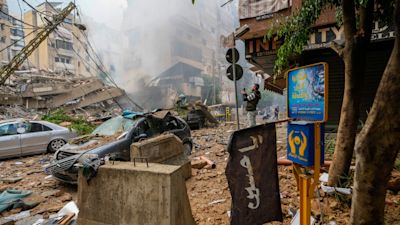How Israel's offensive into Lebanon has ripped up the old diplomatic playbook

ITV News' Security Editor Rohit Kachroo reports from Israel on its military incursion into Lebanon
This was meant to be the war that no one wanted.
A conflict which both sides would threaten, before backing away from. The argument was simple: if Israel and Hezbollah could claim to have had the final word, the threat of another conflict would, for now, remain just that - a threat.
But this phase of the war - the unexpected attacks of the past two weeks in Lebanon, and the overnight offensive which Israeli officials prefer to call a “limited ground incursion” - have shown how meaningless the ‘cycle of violence’ cliche has become in a conflict no longer spinning in a circle, but spiralling along an unpredictable path.
The old assumptions about where the red lines lie, and how Tehran and Washington would influence their partners, have infected popular thinking - everyone from the social media commentariat to senior western diplomats.
Our concern here should not be for the accuracy of their tweets, or even their diplomatic cables, but the erosion of the old certainties that lie behind the guesswork and the diplomacy designed to stop the nations and militant groups in question from going to war.
Those unwritten rules that the parties would only go so far, that allies would step in to stop them from going further, have never led to peace in the region - but they have helped to prevent direct conflict between Israel and Iran and, for years, between Israel and Hezbollah.
Are things changing?
Foresight can help to prevent conflicts - if the key players know their enemies and their allies well enough, perhaps the worst outcomes can be avoided.
But neither Nasrallah nor Biden have been able to second guess Netanyahu in the way each once thought they could.
Both might have expected him to stop short of a ground operation in Lebanon, for example.
Why would Israel want to invite an attack from Iran, and become entangled in a conflict on a larger scale than its year-long war in Gaza, they might have asked. The potential for miscalculation is huge.
But consider how wrong so many players have already been, including the US.
For weeks it has been saying it wanted de-escalation, speaking confidently about the prospects of a pause in the fighting - all in the hope that its Israeli allies, so reliant on American military support, would fall in line.
In fact it was the US, the senior partner, falling in line, when the State Department spokesman warned last night that "military pressure can at times enable diplomacy” - a change in tone to fit the "de-escalation through escalation" approach being pushed by Israel.
Subscribe free to our weekly newsletter for exclusive and original coverage from ITV News. Direct to your inbox every Friday morning.
The US is trying to project unity with an ally which it is struggling to influence. It knows an image of disunity would be damaging to the prospects for de-escalation - but its sense of powerlessness behind the scenes has been revealed again in Lebanon overnight.
It’s a diplomatic mess as well as a humanitarian crisis, with the gap growing between Washington’s private requests of Israel and its public statements.
One moment it’s frosty calls between Biden and Netanyahu in private, the next it’s supportive statements in press conferences such as the State Department’s yesterday. The US is watching events in the Middle East knowing its ability to shape events is shrinking.
Something else to consider. Israel has been planning its operation in Lebanon for a while now, with little warning to allies who might have expected a heads-up.
Shamed, stunned, and caught off guard by the October 7 attacks, its military has taken its time organising this operation in a way it didn’t in Gaza.
The sequence of events which continues in Lebanon today began with the deadly and audacious pager attacks two weeks ago, when exploding devices killed dozens in a carefully planned operation made possible by deep intelligence penetration.
In the days that followed, Israel watched closely and observed a shift in the behaviour of Hezbollah’s leader, Sayyed Hassan Nasrallah - humbled, humiliated, isolated and unable to rely on some of his key confidants who had been killed in preceding attacks.
We now know his killing last Friday was the prelude to an invasion. But it’s also clear how the military planners held the details tight, excluding some close allies, according to another diplomat source who spoke to ITV News on condition of anonymity.
With the old playbook ripped up, and given the unpredictability of each side’s actions, traditional assumptions are crumbling, leaving the risk of a broader regional war growing.
Want a quick and expert briefing on the biggest news stories? Listen to our latest podcasts to find out What You Need To Know...